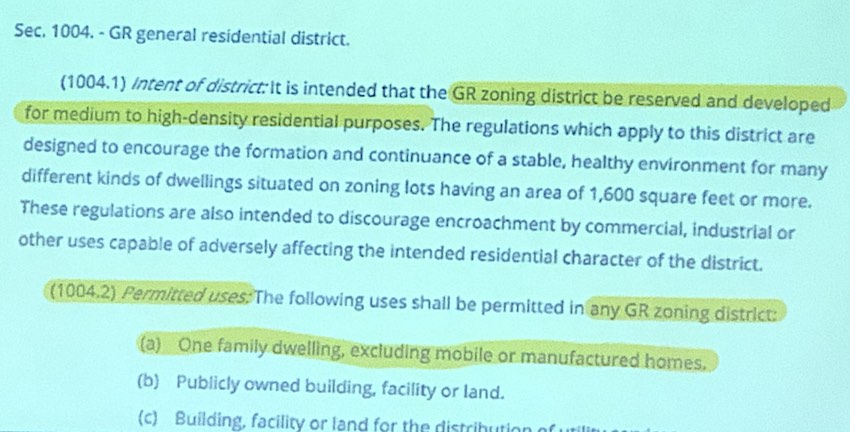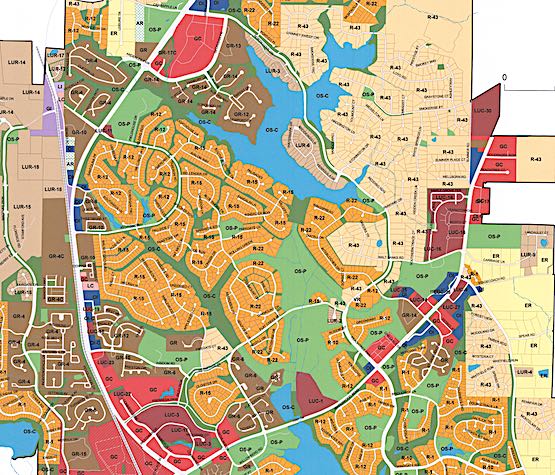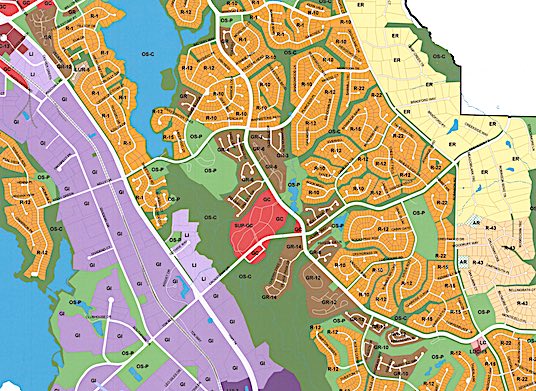Procedural move recognizes ban never really prohibited anything, since it was always lifted when requested —
For the first time since the mid-1990s, Peachtree City has no moratorium on rezoning for apartments and other multi-family dwelling developments.
After a nearly 2-hour discussion last week, the City Council voted 5-to-0 against renewing that barrier to bringing a multi-family rezoning petition before the body.
But the discussion revealed another concern: Every one of the city’s widely used residential zones — GR for General Residential — already contains an express right to build multi-family units with no further rezoning needed. (See the 2019 city zoning maps nearby.)
“No one from staff is advocating that we eliminate the moratorium so that we can have more apartments,” City Manager Jon Rorie told the council at the Nov. 21 meeting.
The problem with the paper ban was that it involved prohibiting even a hearing on the merits of the issue, a constitutionally shaky position for the city to defend.
“The issue at hand is the validity of the moratorium,” Rorie said, explaining that after 20 years of the moratorium it is no longer legally defensible from a constitutional standpoint.
Rorie pointed out that in the past several years, the ban was lifted in every case to allow an applicant to present its case for denser residential rezoning, and in every case the council ultimately voted against the rezoning during a regular hearing.
What will happen now is that a developer can approach the city with a multi-family rezoning request just like any other rezoning request and receive a full hearing.
Rorie said why take the chance of losing a lawsuit against the moratorium on constitutional grounds when the city could more easily defend its ultimate rezoning decision under the city’s more expansive legislative powers of rezoning.
After voting for eliminating the moratorium, the council discussed the possibilities of builders taking advantage of the already existing right to build new apartments in redeveloped GR zones that are not developed up to the limit of dwelling units per acre, including many that now hold only detached single family housing.
STORY CONTINUES AFTER GRAPHIC

“[Developers] could buy land already zoned GR and build what they want up to 25 units per acre,” said Councilman Kevin Madden. “We need to amend the zoning ordinance to [keep] what is currently on the land.”

Speculation continued about how it might be financially viable for an investor to buy up some single family detached homes on land zoned GR, tear them down, and replace them with 10 to 25 units per acre in new apartments, all without needing a rezoning hearing or council permission.
Planning and Development Director Robin Cailloux told the council that the city has only one undeveloped parcel of land zoned GR. That 10-acre parcel lies behind Peachtree City Elementary School off Wisdom Road.

Rorie asked the council for some guidance on what ordinance changes the council wanted. He may get direction for that during a council workshop scheduled for four hours at City Hall, 3:30 p.m. to 7:30 p.m. on Tuesday, Dec. 3.
The accompanying current Peachtree City zoning map shows the northern and southern halves of the city, roughly bisected from left to right by the four lanes of Ga. Highway 54. The General Residential zones are in brown. The number following the GR — as in GR-10 — denotes the maximum number of dwelling units allowed per acre. The GR zone, without a number, allows up to 25 units per acre. Generally speaking the northern part of the city above Hwy. 54 has more acres contained within GR zones than the southern sector.















Leave a Comment
You must be logged in to post a comment.